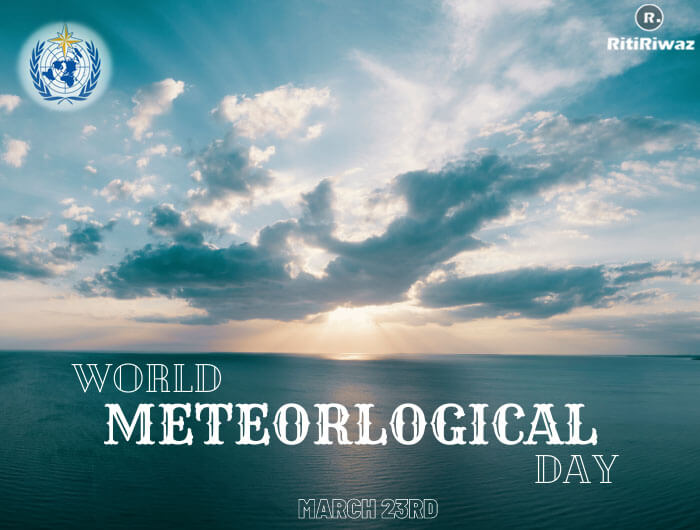World Meteorological Day

World Meteorological Day takes place every year on 23 March and commemorates the coming into force on 23 March 1950 of the Convention establishing the World Meteorological Organization (WMO). WMO originated from the International Meteorological Organization (IMO), which was founded in 1873 to facilitate the exchange of weather information across national borders.
WMO used to earlier provide information related to shipping and travel and with time it has covered all the aspects related to climate, weather, and water. The due importance of WMO has increased manifold.
This celebration has been officially celebrated for the first time in 1961 with different topics as main themes every single year since that first event. It showcases the essential contribution of National Meteorological and Hydrological Services to the safety and wellbeing of society and is celebrated with activities around the world.
The words “meteor” and “meteorological” come from a Greek word meaning “raised” or “lofty”. We have used both words since the 16th century for lumps of the rock hitting us from the sky or the science relating to the atmosphere.
The themes chosen for World Meteorological Day reflect topical weather, climate, or water-related issues. The World Meteorological Day 2025 theme is “Closing the Early Warning Gap Together.”
More about oceans
The world is 70% water, and the ocean is key to understanding our weather and climate. The ocean controls the Earth’s climate by modulating the global hydrological cycle – as well as through its heat storage capacity – and redistributing this heat. Its currents are crucial for regulating temperature, precipitation, and humidity. Every raindrop that falls on land and every mountain stream begins in the ocean, and will eventually return to it. The World Meteorological Day theme 2021 was – The ocean, our climate, and weather – celebrates WMO’s focus in connecting the ocean, climate, and weather within the Earth System.
Some of the ways you can hone your weather-observing skills to make life on the water safer and more rewarding.Record what you see. You can do this in a handheld journal or on your phone’s memo app; just take note of what you see in the sky and in the water! As time goes on, you should be able to look back on what you observed (fluffy clouds, rough water, or clear skies… whatever it may be) and make connections once you’ve developed a basic understanding of weather at sea.
Keep a camera close by. This tip ties in with our advice on recording everything you see… what more objective and true-to-life way to measure weather than with a camera? Whether you use your phone or your trusty point-and-shoot camera, keeping something with you onboard to capture interesting phenomena will add some weight to your observations.
Study up! You’ll be able to lend some logic to your observations and predictions when you arm yourself with the basics behind clouds, wave behavior, and coastal climates. Get to know your area and what different formations or occurrences mean—what you only casually noticed before could turn out to be pretty significant in the scheme of things! Visit our article on cloud formations to learn what clouds’ different shapes and altitudes really mean for your weather.
Pay attention to forecasts. There’s no better way to prepare yourself than to come equipped with a clear forecast. Know what to expect, when to expect it, and what to look for as a clue-in; often, the hints before a storm are much more obvious than you might think!
Make predictions. You might not have a degree in meteorology, but even with an amateur understanding of weather you’re able to decipher and predict several changes and big occurrences in the weather around you. When you keep track and study climate and weather, you can more accurately plan for long days on the water and be prepared in case you need to cut your trip short.
Suggested Read: Important Days In March
